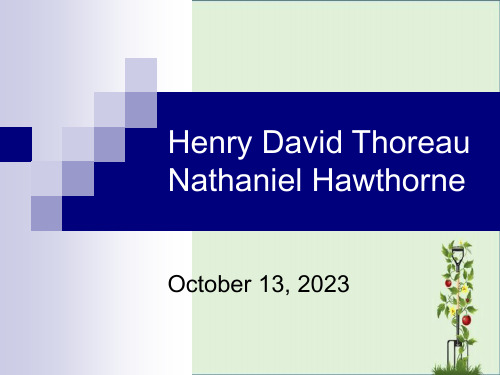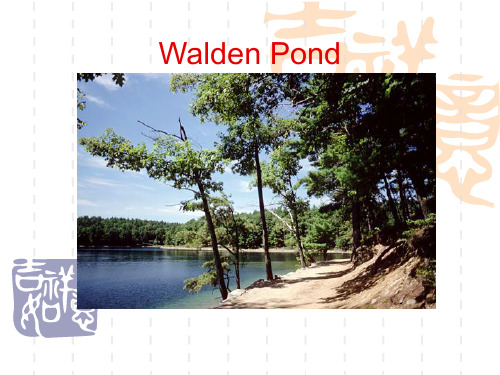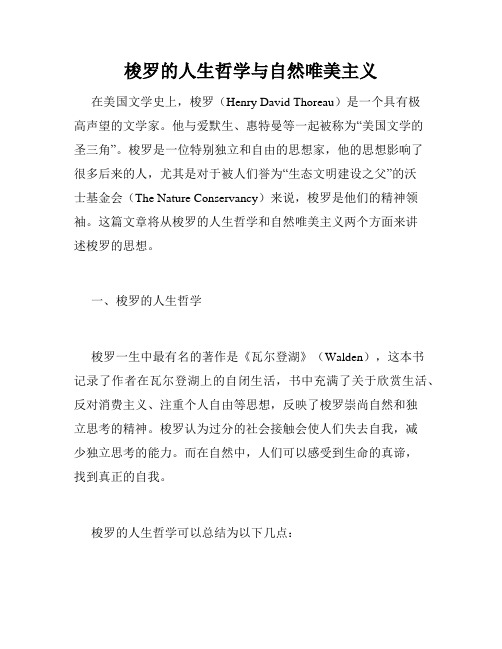Henry David Thoreau美国文学作家
亨利·大卫·梭罗的深思与自然主义

亨利·大卫·梭罗的深思与自然主义亨利·大卫·梭罗(Henry David Thoreau)是19世纪美国的一位重要作家、思想家和社会改革者。
他以其对自然的深思和自然主义的观点而闻名于世。
在这篇文章中,我们将探讨亨利·梭罗对自然的独特看法、对人类与自然关系的思考以及他对自然主义的贡献。
一、亨利·梭罗的自然观亨利·梭罗是一位热爱大自然的人,他通过生活在瓦尔登湖边两年多时间来实践他对大自然的追求。
他认为,现代社会过于注重物质享乐,忽视了与大自然的联系。
在《瓦尔登湖》一书中,梭罗描述了他与大自然共同生活时所体验到的宁静和心灵上的满足感。
梭罗把人类和大自然看作是一个整体,在大自然中找到真正属于自己的位置。
他尊重每一片叶子、每一只昆虫,认为它们都有着独特而珍贵的存在价值。
因此,他呼吁人们应该保护自然环境,以保持人类与自然的和谐共处。
二、亨利·梭罗对人类与自然关系的思考亨利·梭罗对人类与自然关系的思考是他哲学观念中的重要组成部分。
他认为,现代社会中过度追求物质财富和功名利禄的价值观是导致人与自然疏离的主要原因。
他主张人们应该回归到简朴生活,并寻找内心真正的幸福感。
梭罗关注人类对大自然造成的破坏,特别是工业化和城市化进程中大量消耗自然资源、破坏生态平衡所带来的问题。
他提出了一种可持续发展和环境保护的理念,呼吁人们减少浪费,尊重大自然,并将其作为社会发展的基础。
三、亨利·梭罗对自然主义的贡献亨利·梭罗被视为自然主义运动(Transcendentalism)的代表人物之一。
他在文学上积极宣扬了这一思想流派,并辅以个人经历和观察加强了其说服力。
在梭罗的著作中,他展示了对大自然的深入观察和思考,以及对自然界规律的理解。
他不仅描述了自然景观的美丽和宏伟,还通过细致入微的描写展示了每个人与大自然之间微妙而重要的联系。
亨利戴维梭罗

• 13、绝对而言,财富越多,美德就越少。 • 14、充斥自信地追求你旳梦想!去过你梦想中旳生活。当你让自己旳
生活变得简朴,宇宙旳法则也会变得简朴。
• 15、我们旳生活都被花费在细节上……简朴,再简朴。 • 16、不要回头看,除非你想走回去。 • 17、任何事物旳代价等于你用多少生命去换取它 • 18、你必须活在当下,乘着每一种波浪前行,在每一刻找到你旳永恒。
人物特点
• 梭罗身材不高。很坚实,浅色旳皮肤,强健旳严厉旳蓝 眼睛,庄重旳态度——在晚年他脸上留着胡须,与他很 相宜。他旳五官都敏锐,他体格结实,能够吃苦耐劳, 他旳手使用起工具来,是强健敏捷旳。而他旳身体与精 神配合得非常好,他能够用脚步测量距离,比别人用尺 量得还准些。他说他夜里在树林中寻找途径,用脚比用 眼睛强,他能够用眼睛估计两棵树旳高度,非常精确; 他能够像一种牲畜贩子一样地估计一头牛或是一口猪旳 重量。一只盒子里装着许多散置着旳铅笔,他能够迅速 地用手将铅笔一把一把抓出来,每次恰好抓出一打之数。 他善于游泳,赛跑,溜冰,划船,在从早至晚旳长途步 行中,大约能够压倒任何乡民。而他旳身体与精神旳关 系比我们臆度旳这些还要精妙。他说他旳腿所走旳每一 步路,都是他要走旳。照例他路走得越长,所写旳作品 也更长。假如把他关在家里,他就完全不写了。
后世影响
• 梭罗对美国文明旳独立发展产生了不可估计旳 影响,他旳《论公民旳不服从》对美国民主主 义旳发展产生了巨大影响。列夫·托尔斯泰在 1923年读到这篇文章,对它崇敬不已。圣雄甘 地在南非当律师时,宣读这篇文章为触犯了种 族歧视法规旳印度人辩护。甘地深受梭罗旳影 响,成了一位终身非暴力对抗和悲观抵制非正 义权势旳典范。经过甘地,梭罗旳主张变成了 政治活动旳工具。后来在二十世纪,年轻旳马 丁·路德·金也深受甘地旳影响,梭罗旳主张便 在美国民权运动旳思想基础中得到了新生。
Henry-David-Thoreau-大卫梭罗

1. Henry David Thoreau (2)
1. Henry David Thoreau (3)
He was born in Concord, Massachusetts. From 1841 to 1843 Thoreau lived in the home
of American essayist and transcendental philosopher Ralph Waldo Emerson. In 1845 Thoreau moved to a crude hut on the shores of Walden Pond, where he devoted his time to studying nature, meditating on philosophical problems, reading classic literature, and holding long conversations with his neighbors.
Reading Assignments
1. Henry David Thoreau (1)
1817-1862, American writer, philosopher, and naturalist, whose work demonstrates how the abstract ideals of libertarianism and individualism can be effectively instilled in a person”s life.
1. Henry David Thoreau (6)
Studies on Thoreau 王光林:《美国的梭罗争论》,《华东师
范大学学报》〔哲学社会科学版〕,2023 年第6期,第99-103+117页。 陈爱华:《梭罗在中国:1949至2023》, 《四川外语学院学报》,2023年第2期,第 42-45页。
Henry David Thoreau

Major Works
• Resistance to Civil Government(1849)/Civil Disobedience(1886) • Walden/Life in the Woods(1854) • Note: • July 4,1845---went to live by Walden Pond • July 1846---got imprisoned • September 6,1847---left Walden Pond • January&February1848---delivered lectures on "The Rights and Duties of the Individual in Relation to Government" • May 1849---publish Resistance to Civil Government • 1854---published Walden
•
Henry David Thoreau was an
American author, poet, philosopher, abolitionist(废奴主义), naturalist, tax resister, development critic, surveyor, and historian. A leading transcendentalist(超验主义者),[2] Thoreau is best known for his book
•
•
Reconstruction of Thoreau's cabin
• The only two complete books (as opposed to essays) published in his lifetime, Walden and A Week on the Concord and Merrimack Rivers 《在康科德河与梅里麦克河上一周》 (1849), both dealt with nature, in which he loved to wander.
Henry David Thoreau

Henry David Thoreau
Henry Βιβλιοθήκη avid Thoreau 梭罗 American writer, philosopher, and naturalist
1. Life (1817 –1862)
Place of Birth: Concord, Massachusetts Known for Observing nature and social philosophies in his writing
Milestones
1837 Graduated from Harvard University; started a school in Concord the following year, where he taught until its close in 1841 Early 1840s Contributed nature essays and poems to the transcendentalist journal The Dial 1841-1843 Lived in Ralph Waldo Emerson's home and worked briefly on Staten Island as a tutor in 1843 1845-1847 Built a small cabin on the shores of Walden Pond outside Concord, where he lived a simple lifestyle studying nature and writing 1849 Published the book of observations A Week on the Concord and Merrimack Rivers and Civil Disobedience, an essay on nonviolent resistance
梭罗的人生哲学与自然唯美主义

梭罗的人生哲学与自然唯美主义在美国文学史上,梭罗(Henry David Thoreau)是一个具有极高声望的文学家。
他与爱默生、惠特曼等一起被称为“美国文学的圣三角”。
梭罗是一位特别独立和自由的思想家,他的思想影响了很多后来的人,尤其是对于被人们誉为“生态文明建设之父”的沃士基金会(The Nature Conservancy)来说,梭罗是他们的精神领袖。
这篇文章将从梭罗的人生哲学和自然唯美主义两个方面来讲述梭罗的思想。
一、梭罗的人生哲学梭罗一生中最有名的著作是《瓦尔登湖》(Walden),这本书记录了作者在瓦尔登湖上的自闭生活,书中充满了关于欣赏生活、反对消费主义、注重个人自由等思想,反映了梭罗崇尚自然和独立思考的精神。
梭罗认为过分的社会接触会使人们失去自我,减少独立思考的能力。
而在自然中,人们可以感受到生命的真谛,找到真正的自我。
梭罗的人生哲学可以总结为以下几点:1. 注重个人独立和自由梭罗崇尚独立思考,反对盲从。
他认为人们应该按照自己的意志去做事情,而不是随波逐流。
同时,他反对奢侈消费,呼吁人们在精神和物质上都要保持清醒。
2. 欣赏自然的美好梭罗的作品中处处体现出他对自然的热爱。
他认为人们应该保护自然,欣赏自然的美好,并从中汲取灵感。
3. 反对社会约束梭罗认为社会的规则和限制会让人们失去自由和独立思考的能力。
他呼吁人们要有勇气去挑战常规,追求自己的理想。
二、梭罗的自然唯美主义梭罗的自然唯美主义可以用他的话来概括:“万物皆为美,只要我们有心而观之。
”梭罗认为自然是上帝的杰作,人应该欣赏自然的美好,并从中体验到人生的价值。
他反对人类对自然的破坏和掠夺,呼吁人们应该懂得尊重自然、保护自然,使得人与自然和谐共处。
梭罗的自然唯美主义可以从以下几个方面来理解:1. 把握自然的内在美梭罗认为自然中存在着一种内在的美,人们只有用一颗敏锐的心来感知,才能体会到它的精神内涵。
与此同时,梭罗认为自然中的每一种生命都有其独特的美丽之处,只要我们用心去观察,就能够从中领悟人生的真谛。
Henry David Thoreau
I love to be alone. I never found the companion that was so companionable as solitude.
我爱孤独。我没有碰到比寂寞更好的同伴了
The value of a man is not in his skin, that we should touch him.
Henry David Thoreau (1817—1862)
Henry David Thoreau
1
Life Style Work Contribution
2
3 4
Life
An American author, poet, philosopher, abolitionist, naturalist, tax resister, development critic, surveyor, historian, and leading transcendentalist. Born in Concord, Massachusetts, into the "modest New England family" of John Thoreau (a pencil maker) and Cynthia Dunbar. Studied at Harvard University between 1833 and 1837. On graduation he stayed with his family, first helping his father to make pencils and then, for a time, running a private school.
美国文学瓦尔登湖
• “我到林中去,因为我希望谨慎地生活,只面对生活的基本事实,看看我是否 学得到生活要教育我的东西,免得到了临死的时候,才发现我根本就没有生活 过。我不希望度过非生活的生活,生活是这样的可爱;我却也不愿意去修行过 隐逸的生活,除非是万不得已。我要生活得深深地把生命的精髓都吸到,要生 活得稳稳当当,生活得斯巴达式的,以便根除一切非生活的东西,划出一块刈 割的面积来,细细地刈割或修剪,把生活压缩到一个角隅里去,把它缩小到最 低的条件中,如果它被证明是卑微的,那末就把那真正的卑微全部认识到,并 把它的卑微之处公布于世界;或者,如果它是崇高的,就用切身的经历来体会 它,在我下一次远游时,也可以作出一个真实的报道。
• * 贝克田庄(Baker Farm)
• * 更高的法则 / 更高的规律(Higher Laws) • * 禽兽为邻('Brute Neighbors) • * 室内取暖(House-warming)
• * 昔日的居民 / 旧居民;冬天的访客(Former Inhabitants; and Winter Visitors)
Renew thyself completely each day; do it again, and again and forever again.
【选自】 • “苟日新,日日新,又日新。”选自《大学》 • 【原文】 • 汤之《盘铭》曰:“苟日新,日日新,又日新。”。 • 【注释】 • 汤:即成汤,商朝的开国君主。盘铭:刻在器皿上用来警诫 自己的箴言。这里的器皿是指商汤的洗澡盆。 • 苟:如果。新:这里的本义是指洗澡去除身体上的污垢,使 身体焕然一新;引申义则是指精神上的弃旧图新。
An honest man has hardly need to count more than his ten fingers, or in extreme cases he may add his ten toes, and lump the rest. Simplicity, simplicity, simplicity! I say, let your affairs be as two or three, and not a hundred or a thousand; instead of a million count half a dozen, and keep your accounts on your thumb-nail. …and he must be a great calculator indeed who succeeds. Simplify, simplify. Instead of three meals a day, if it be necessary eat but one; instead of a hundred dishes, five; and reduce other things in proportion.
亨利·戴维·梭罗(Henry David Thoreau)
弥尔顿故居
弥尔顿画像
作品:
• "Paradise Lost"《失乐园》 • "paradise"《复乐园》 • "Samson"《力士参和孙》
• But headlong joy is ever on the wing. • ——John Milton,British poet • 轻率的快乐总是瞬息即逝。 • ——英国诗人 弥尔顿.J.
作品:
His poem language vivid, simple, often in plain in the magic show, and lofty mood often have an inspired passage.
(1) the lyric: 歌谣集》, "Tintern Abbey"《丁登寺旁》 (2) the long poem: "Overture"《序曲》 (3) the autobiographical narrative poem: "revolution and independence"《革命与独立》 (4) "the immortal song"《不朽颂》 (5) "hiking"《远足》
瓦尔登湖(Walden)
Thoreau described in detail in the book, he spent two years and a regeneration of the forest to think of life as well as many of his two-month period in Walden Lake.
当我们离自然越来越远的 时候,当我们的精神已经 越来越麻木的时候,《瓦 尔登湖》这本书无疑能带 我们回归心灵的纯净世界。
亨利·戴维·梭罗
HENRY DAVID THOREAU
(1871-1862)
亨利· 戴维· 梭罗(Henry David Thoreau,1817年7月12日-1862年5月6日),美国享 誉世界的19世纪作家、哲学家,超验主义代表人物,也是一位废奴主义及自然主义者, 有无政府主义倾向,曾任职土地勘测员。毕业于哈佛大学,曾协助爱默生编辑评论季
19世纪,随着资本主义社会生产力的高速发展,人们开始越来越多地感受到物质文明给人们带来
的“先进”,为机械化生产带来的高速发展而倾倒,对物质的追求日益显露。商品化时代可以最大程 度地满足人们日益增长的物质需求,任何精神信念在这强大的资本主义发展的大潮中都变得苍白无力 不堪一击。面对这种现象,许多学者、思想家和其他一些仁人志士都产生了一种前所未有的疑虑:难 道资本主义商品化社会就是我们人类的理想家园吗?难道现实中的金钱社会就是我们的精神归宿吗? 带着这种种疑虑,梭罗——这位先验主义思想家独自一人住进了离康城不远的湖畔林中。在那里,他 虽然只住了两年零两个月又两天的时间,但其意义却相当深远。在那两年多的时间里,梭罗自食其力, 完全靠自己的双手建屋取食过上一种原始简朴的生活。他要通过自己的实践向世人证明,人们完全不 应该将时间倾注于无休止的物质追求方面,而应当将少量的时间用于谋生而将更多的时间用于精神探 索。
代表作
《康科德河和梅里麦克河上的一个星期》 (A Week on the Concord and Merrimac Rivers ,1839年) 《论公民的不服从权利》 (Civil Disobedience ,1849年) 《马萨诸赛州的奴隶制度》 (Slavery in Massachusetts ,1854年) 《瓦尔登湖》 (Walden ,1854年) 《为约翰· 布朗上校请愿》 (A Plea for Captain John Brown ,1860年) 《远足》 (Excursions ,1863年) 《缅因森林》(The Maine Woods ,1864年) 《科德角》 (Cape Cod ,1865年) 《马萨诸赛州的早春》 (Early Spring in Massachusetts,1881年) 《夏》(Summer ,1884年)
- 1、下载文档前请自行甄别文档内容的完整性,平台不提供额外的编辑、内容补充、找答案等附加服务。
- 2、"仅部分预览"的文档,不可在线预览部分如存在完整性等问题,可反馈申请退款(可完整预览的文档不适用该条件!)。
- 3、如文档侵犯您的权益,请联系客服反馈,我们会尽快为您处理(人工客服工作时间:9:00-18:30)。
– This chapter consists entirely of a poem, "The
Synopsis (contents)
Where I Lived, and What I Lived For
– After playing with the idea of buying a farm, Thoreau describes his cabin's location. Then he explains that he took up his abode at Walden Woods so as to "live deliberately, to front only the essential facts of life, and see if I could not learn what it had to teach, and not, when I came to die, discover that I had not lived."
Works (Selected)
A Plea for Captain John Brown, 1859 Cape Cod, 1865 A Yankee in Canada, 1866 Complete Works, 1929 (5 vols.) Collected Poems, 1943
Walden
Background information Synopsis (contents) Themes
Background information about Walden
A reproduction of Thoreau's cabin with a statue of Thoreau
Background information about Walden sojourn in a cabin near Walden The book details Thoreau's
Solitude
– Thoreau rhapsodizes about the beneficial effects of
Synopsis (contents)
Visitors – Thoreau writes about the visitors to his cabin. Among the 25 or 30 visitors is a young FrenchCanadian woodchopper, Alec Therien, whom Thoreau idealizes as approaching the ideal man, and a runaway slave, whom Thoreau helps on his journey to freedom in Canada. The Bean-Field – Thoreau relates his efforts to cultivate two and a half acres of beans. He plants in June and spends his summer mornings weeding the field with a hoe. He sells most of the crop, and his small profit of $8.71 covers his needs. The Village
Works (Selected)
A Week on the Concord and Merrimack Rivers, 1849 Resistance to Civil Government / Civil Disobedience / On the Duty of Civil Disobedience, 1849 Walden; or, Life in the Woods, 1854 Excursions, 1863 The Maine Woods, 1864 Slavery in Massachusetts, 1854
Synopsis (contents)
Economy
– This is the first chapter and also the longest by far. Thoreau begins by outlining his project: a two-year and two-month stay at a crude cabin in the woods near Walden Pond. He does this, he says, in order to illustrate the spiritual benefits of a simplified lifestyle. He easily supplies the four necessities of life (food, shelter, clothing, and fuel). He meticulously records his expenditures and earnings, demonstrating his understanding of "economy," as he builds his house and buys and grows food. For a home and freedom, he spends a mere $28.13.
Pond, amidst woodland owned by his friend and mentor Ralph Waldo Emerson, near Concord, Massachusetts. Thoreau did not intend to live as a hermit, for he received visitors and returned their visits. Instead, he hoped to isolate himself from society in order to gain a more objective understanding of it. Simple living and self-sufficiency were Thoreau's other goals, and the whole project was inspired by transcendentalist philosophy, which was one of the key ideas of the American Romantic Period. As Thoreau made clear in his book, his cabin was not in wilderness but at the edge of town, not far from his family home.
Synopsis (contents)
Sounds
– Thoreau opens this chapter by warning against relying too much on literature as a means of transcendence. Instead, one should experience life for oneself. Thus, after describing his cabin's beautiful natural surroundings and his casual housekeeping habits, Thoreau goes on to criticize the train whistle that interrupts his reverie. To him, the railroad symbolizes the destruction of the good old pastoral way of life. Following is a description of the sounds audible from his cabin: the church bells ringing, carriages rattling and rumbling, cows lowing, whip-poor-wills singing, owls hooting, frogs croaking, and cockerels crowing.
Synopsis (contents)
Baker Farm
– While on an afternoon ramble in the woods, Thoreau gets caught in a rainstorm and takes shelter in the dirty, dismal hut of John Field, a penniless but hard-working Irish farmhand, and his wife and children. Thoreau urges Field to live a simple but independent and fulfilling life in the woods, thereby freeing himself of employers and creditors. But the Irishman won't give up his dreams of luxury, which is the American dream.
Reaes discourse on the benefits of reading classical literature (preferably in the original Greek or Latin) and bemoans the lack of sophistication in Concord, manifested in the popularity of popular literature. He yearns for a utopian time when each New England village
